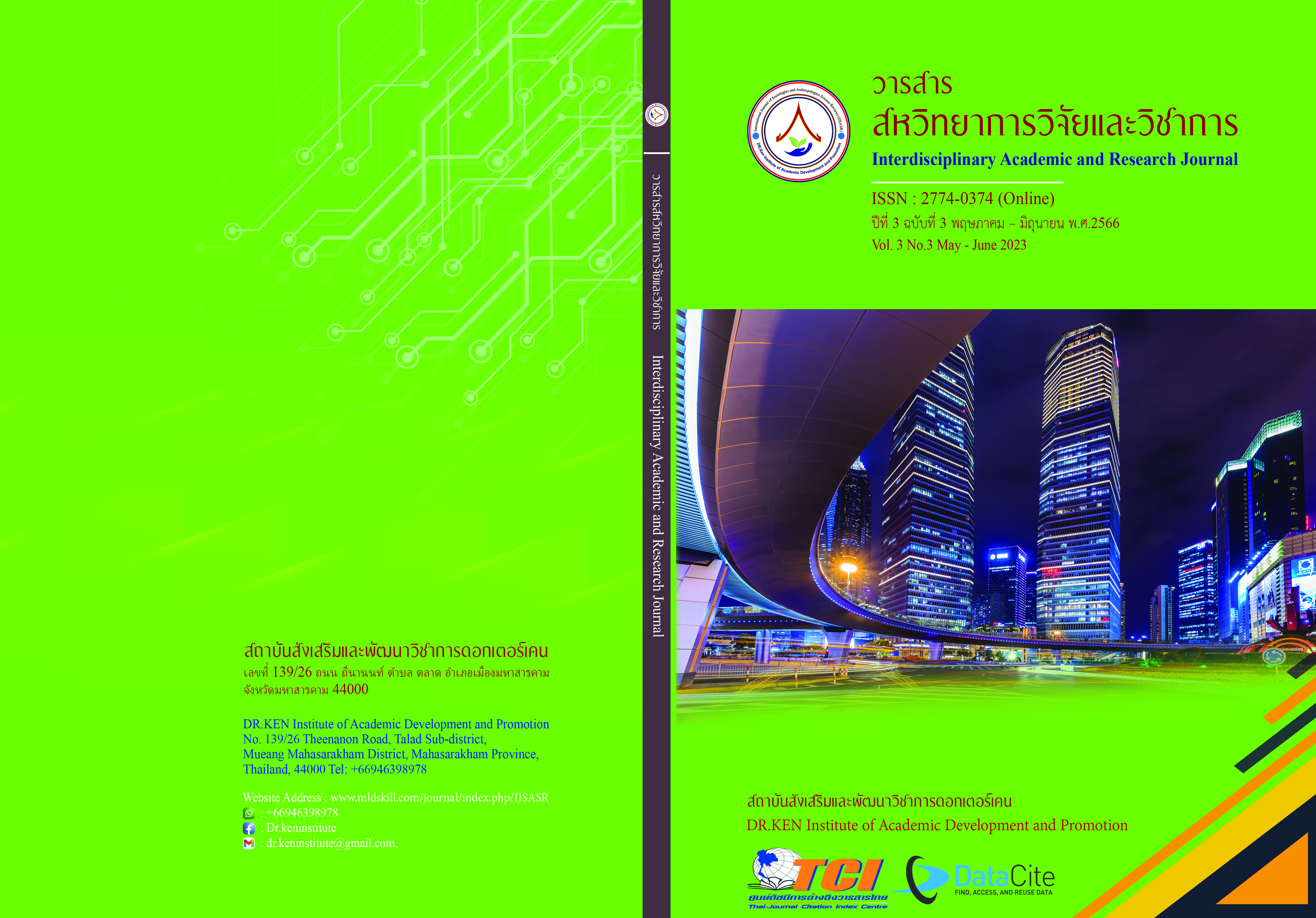Management Innovation of Public Health Long-Term Care Service for Dependent Elderly, in Local Administrative Organizations, Health Region 7
DOI:
https://doi.org/10.14456/iarj.2023.151Keywords:
Process Innovation; , Flood Management; , Public Health Long-Term Care Service System for Dependent ElderlyAbstract
Elderly care through the long-term care system is the provision of public health and social services to meet the supportive needs of those experiencing difficult conditions due to chronic illnesses, accidents, and disabilities, as well as elderly people who are old and unable to support themselves in their daily lives, the main goal is how to get proper care for dependent elderly people. Therefore, this research has a purpose; (1) To study opinions on factors influencing the management of long-term health care services for the dependent elderly. (2) To study factors influencing the management of public health long-term care services for the dependent elderly. And 3) to establish and validate the management innovation of public health long-term care services for the dependent elderly. The research method is divided into 2 phases; Phase 1: An exploratory research model to determine the effectiveness of public health long-term care service management for dependent elderly in local government organizations. The sample group from the sample calculation formula of Hair, Black, Babin, and Anderson was 390 people. A questionnaire was used to collect data with a confidence value of the entire questionnaire equal to 0.84. Data were analyzed by the computer program, descriptive statistics were used including frequency, percentage, mean, standard deviation, and Structural Equation Model analysis. Phase 2: This is qualitative research to create innovations in the management of long-term health care services for the dependent elderly, with the Delphi technique, to create a model of experts or experts or persons responsible for the health care of 20 dependent elderly people. The final model was confirmed by 10 high-level experts, specifically randomized with data analysis by content analysis. The results showed that: (1) The overall level of opinions on factors influencing the management of public health long-term care services for the dependent elderly was at a high level. (2) Factors influencing management effectiveness related to long-term health care service management innovation for dependent elderly in local administrative organizations, Health Region 7, which set statistical significance at p-value<0.05. And the coefficients of influence can be ordered from highest to lowest as follows; The factor most influencing was the management dimension factor with a coefficient of positive influence on management effectiveness equal to 0.52, followed by the network partner dimension factor with coefficients that positively influence the management efficiency equal to 0.09, the dimension factor of community support had a coefficient that had a positive influence on management effectiveness equal to 0.07, and the lowest was the management dimension factor with a coefficient that had a positive influence on management effectiveness equal to 0.03, respectively, the factors influencing the overall management effectiveness of 12 factors, could explain the variation in outcome variables or could be predicted by 44.00% (R2=0.44, p-value<0.05). (3) The experts’ opinion that the model was appropriate and confirmed the model. The innovations in the management of public health long-term care services for the dependent elderly were summarized in 4 variables as follows; (1) the dimension of community support, (2) dimensions of organizational competence, (3) the network dimension, and (4) the management dimension.
References
กรมส่งเสริมการปกครองส่วนท้องถิ่น. (2566). จำนวนองค์กรปกครองส่วนท้องถิ่น ปี 2566. สืบค้นจาก http://www.dla.go.th/work/abt/index.jsp.
กระทรวงสาธารณสุข. (2559). คู่มือสนับสนุนการบริหารจัดการระบบบริการดูแลระยะยาวด้านสาธารณสุขสำหรับผู้สูงอายุที่มีภาวะพึ่งพิง ในระบบหลักประกันสุขภาพแห่งชาติ. กรุงเทพฯ : กระทรวงสาธารณสุข.
ปราโมทย์ ประสาทกุล. (2563). สถานการณ์ผู้สูงอายุไทย พ.ศ. 2563.กรุงเทพฯ : สถาบันวิจัยประชากรและสังคม มหาวิทยาลัยมหิดล.
ปวีณ์สุดา จันหุณี และฟ้าใส สามารถ. (2562). ประสิทธิผลการจัดการระบบการดูแลระยะยาวสำหรับผู้สูงอายุที่มีภาวะพึ่ง ของเทศบาลนครนนทบุรี อำเภอเมือง จังหวัดนนทบุรี. การประชุมวิชาการระดับชาติ มหาวิทยาลัยเทคโนโลยีราชมงคลรัตนโกสินทร์ ครั้งที่ 4 และ การประชุมวิชาการระดับนานาชาติ มหาวิทยาลัยเทคโนโลยีราชมงคลรัตนโกสินทร์ ครั้งที่ 1 (The 4th National RMUTR Conference and The 1st International RMUTR Conference). 26 – 28 มิถุนายน 2562.
วิไล ตาปะสี และคณะ. (2560). รูปแบบการจัดบริการการดูแลสุขภาพผู้สูงอายุโดยการมีส่วนร่วมของชุมชน ตำบลวังตะกูจังหวัดนครปฐม. วารสารเกื้อการุณย์, 24. 42-54.
สุภัชญา สุนันต๊ะ. (2561). องค์กรปกครองส่วนท้องถิ่นกับบทบาทการสร้างเสริมสุขภาพชุมช. วารสารกฎหมายสุขภาพและสาธารณสุข, 4(1). 98-107.
Best. (1977). Research in Education. New Jersey: Prentice Hall, Inc.
Hair, J. F., Jr., Black, W. C., Babin, B. J., & Anderson, R. E. (2014). Multivariate data analysis (7 ed.). Harow, Essex: Pearson.
Downloads
Published
How to Cite
Issue
Section
License
Copyright (c) 2023 เริงชาติ ศรีขจรวงศ์, สัญญา เคณาภูมิ, ภักดี โพธิ์สิงห์

This work is licensed under a Creative Commons Attribution-NonCommercial-NoDerivatives 4.0 International License.
Copyright on any article in the Interdisciplinary Academic and Research Journal is retained by the author(s) under the under the Creative Commons Attribution-NonCommercial-NoDerivatives 4.0 International License. Permission to use text, content, images, etc. of publication. Any user to read, download, copy, distribute, print, search, or link to the full texts of articles, crawl them for indexing, pass them as data to software, or use them for any other lawful purpose. But do not use it for commercial use or with the intent to benefit any business.
















.png)


